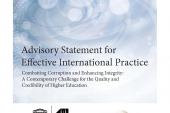Academic fraud in higher education
Academic fraud is on the rise worldwide in developing and developed countries alike. This has become a major challenge in some areas of the world, such as the former Soviet countries. In Ukraine, an independent institution for external student achievement assessment has been created in order to promote more transparent access to higher education (![]() read the full study).
read the full study).
The diversification of higher education services and delivery systems, increased competition among students and institutions, globalization and the cross-border education phenomenon are major global trends that present new challenges and opportunities for academic fraud. In the 2007 Global University Network for Innovation (GUNI) report, IIEP reflected on these new challenges and suggested six lines of action to address them:
- Regulating the market with transparent criteria
- Reducing the risk of conflicts of interest
- Developing standards and codes of conduct of academic integrity
- Using more effective and transparent management tools
- Facilitating public access to information
- Establishing and using awareness indicators, i.e., ‘red flags’
IIEP plays a key role in developing strategies to support countries to improve university admissions and create university charts of ethics. Recently, IIEP helped the University of Rabat in Morocco to develop a chart of ethics. The Institute explained in detail the prerequisites for an effective application of ethical charts, and advocated for the involvement of both faculty and students at each stage of the charter’s development, and for the implementation of indispensable mechanisms to ensure its enforcement.
In 2015 IIEP organised a Policy Forum on Higher Education Integrity and together with the Council for Higher Education Accreditation (CHEA) published a follow up Advisory Statement for Effective International Practice Combatting Corruption and Enhancing Integrity: A Contemporary Challenge for the Quality and Credibility of Higher Education.
In the press
Find out more

02.02.2016 | Publication
Advisory statement for effective international practice. Combatting corruption and enhancing integrity: A contempory challenge for the quality and credibility of higher education

01.06.2015 | News
IIEP Policy Forum on Planning Higher Education Integrity
16.11.2020 - 17.11.2020 | Event
International conference on academic integrity

